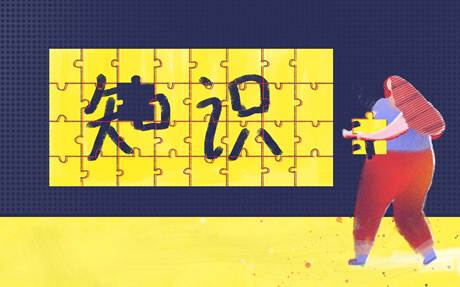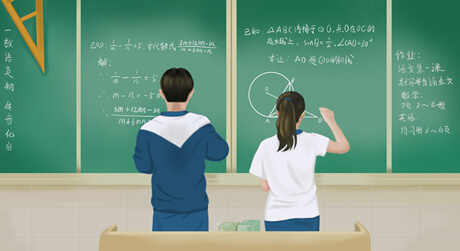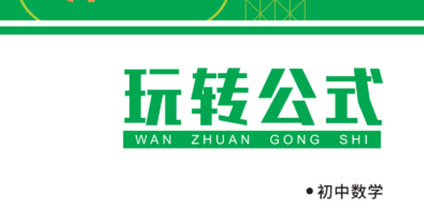中考复习事倍功半:名词的语法聚焦
英语
来源:网络
编辑:小新
2017-08-14 17:04:58
中考是检验初中三年学习成果的考试,要想在中考崭露头角,初中三年得打好基础。英语单词、句式繁多,更要在平时多用时间来复习总结。今天秦学教育小编跟大家分享的是名词的聚焦。更多教育资讯与辅导资料,欢迎关注秦学教育官网初中英语栏目。
 一.名词
一.名词
I.名词的种类:
II. 名词的数:
1. 规则名词的复数形式:名词的复数形式,一般在单数形式后面加-s或-es。现将构成方法与读音规则列表如下:
2. 不规则名词复数:英语里有些名词的复数形式是不规则的,现归纳如下:
III. 名词的所有格:
名词在句中表示所有关系的语法形式叫做名词所有格。所有格分两种:一是名词词尾加’s构成,二是由介词of加名词构成。前者多表示有生命的东西,后者多表示无生命的东西。
1. ’s所有格的构成:
2. ’s所有格的用法:
3. of所有格的用法:
用于无生命的东西:the legs of the chair, the cover of the book
用于有生命的东西,尤其是有较长定语时:the classrooms of the first-year students
用于名词化的词:the struggle of the oppressed

I.名词的种类:
| 专有名词 | 普通名词 | |||
| 国名地名人名,团体机构名称 | 可数名词 | 不可数名词 | ||
| 个体名词 | 集体名词 | 抽象名词 | 物质名词 | |
II. 名词的数:
1. 规则名词的复数形式:名词的复数形式,一般在单数形式后面加-s或-es。现将构成方法与读音规则列表如下:
| 规则 | 例词 | ||
| 1 | 一般情况在词尾加-s | map-maps, sea-seas, girl-girls, day-days | |
| 2 | 以s, x, ch, sh结尾的名词后加-es | class-classes, box-boxes, watch-watches, dish-dishes | |
| 3 | 以-f或-fe结尾的词 | 变-f和-fe为v再加-es |
leaf-leaves, thief-thieves, knife-knives, wife-wives, half-halves |
| 加-s | chief-chiefs, proof-proofs, roof-roofs | ||
| 4 | 以辅音字母加y结尾的名词,变y为i加-es | party-parties, family-families, story-stories, city-cities | |
| 5 | 以元音字母加y结尾的名词,或专有名词以y结尾的,加-s | toy-toys, boy-boys, day-days, ray-rays, Henry-Henrys | |
| 6 | 以辅音字母加-o结尾的名词 | 一般加-es | Negro-Negroes, hero-heroes, potato-potatoes, tomato-tomatoes |
| 不少外来词加-s | piano-pianos, photo-photos, auto-autos, kilo-kilos, solo-solos | ||
| 两者皆可 | zero-zeros/zeroes, volcano-volcanoes/ volcanos | ||
| 7 | 以元音字母加-o结尾的名词加-s | radio-radios, bamboo-bamboos, zoo-zoos | |
| 8 | 以-th结尾的名词加-s | truth-truths, mouth-mouths, month-months, path-paths, | |
2. 不规则名词复数:英语里有些名词的复数形式是不规则的,现归纳如下:
| 规则 | 例词 | ||
| 1 | 改变名词中的元音字母或其他形式 | man-men, woman-women, foot-feet, goose-geese, mouse-mice | |
| 2 | 单复数相同 | sheep, deer, means, works, fish, yuan, jin, | |
| 3 | 只有复数形式 | trousers, clothes, thanks, goods, glasses, | |
| 4 | 一些集体名词总是用作复数 | people, police | |
| 5 | 部分集体名词既可以作单数(整体)也可以作复数(成员) | class, family, crowd, couple, group, government, population, team, public, party | |
| 6 | 复数形式表示特别含义 | customs(海关), times(时代), spirits(情绪), drinks(饮料), sands(沙滩), papers(文件报纸), looks(外表), brains(头脑智力), greens(青菜) | |
| 7 | 表示“某国人” | 加-s | Americans, Australians, Germans, Greeks, Swedes, Europeans |
| 单复数同形 | Swiss, Portuguese, Chinese, Japanese | ||
| 以-man或-woman结尾的改为-men,-women | Englishmen, Frenchwomen | ||
| 8 | 合成名词 | 将主体名词变为复数 | sons-in-law, lookers-on, passers-by, story-tellers, boy friends |
| 无主体名词时将最后一部分变为复数 | grown-ups, housewives, stopwatches | ||
| 将两部分变为复数 | women singers, men servants | ||
III. 名词的所有格:
名词在句中表示所有关系的语法形式叫做名词所有格。所有格分两种:一是名词词尾加’s构成,二是由介词of加名词构成。前者多表示有生命的东西,后者多表示无生命的东西。
1. ’s所有格的构成:
| 单数名词在末尾加’s | the boy’s father, Jack’s book, her son-in-law’s photo, | |
| 复数名词 | 一般在末尾加’ | the teachers’ room, the twins’ mother, |
| 不规则复数名词后加’s | the children’s toys, women’s rights, | |
| 以s结尾的人名所有格加’s或者’ | Dickens’ novels, Charles’s job, the Smiths’ house | |
| 表示各自的所有关系时,各名词末尾均须加’s | Japan’s and America’s problems, Jane’s and Mary’s bikes | |
| 表示共有的所有关系时在最后一词末加’s | Japan and America’s problems, Jane and Mary’s father | |
| 表示"某人家""店铺",所有格后名词省略 | the doctor’s, the barber’s, the tailor’s, my uncle’s | |
| 1 | 表示时间 | today’s newspaper, five weeks’ holiday |
| 2 | 表示自然现象 | the earth’s atmosphere, the tree’s branches |
| 3 | 表示国家城市等地方的名词 | the country’s plan, the world’s population, China’s industry |
| 4 | 表示工作群体 | the ship’s crew, majority’s view, the team’s victory |
| 5 | 表示度量衡及价值 | a mile’s journey, five dollars’ worth of apples |
| 6 | 与人类活动有特殊关系的名词 | the life’s time, the play’s plot |
| 7 | 某些固定词组 | a bird’s eye view, a stone’s throw, at one’s wit’s end(不知所措) |
用于无生命的东西:the legs of the chair, the cover of the book
用于有生命的东西,尤其是有较长定语时:the classrooms of the first-year students
用于名词化的词:the struggle of the oppressed
*本文内容来源于网络,由秦学团队整理编辑发布,如有侵权请联系客服删除!
上一篇:中考英语----冠词的语法聚焦
下一篇:初中英语:6本教材的考点分析,所有重点重点都在这里,建议收藏!

我们为您准备了
- 学业水平系统测评
- 个性化一对一辅导计划
- 线下一对一试听课
- 系列学科辅导资料
确认预约
热门活动

艺考文化课集训班

领免费试卷分析+提升方案

中高考全科护航班招生中

异地高考 西安升学规划
热门标签
- 热门课程
- 热门资讯
- 热门资料
- 热门福利
-
 高二化学怎么才能学好?学习化学应该注意哪些点?高二化学怎么才能学好?学习化学应该注意哪些点?学生们都知道,高中化学科目的知识点是十分杂乱的,学习起来压力很大,在课堂上上课的时候,需要我们去记各种笔记,积累各种小的知识点,把这些点都总结完之后,我们就会发现这些知识点其实都是环环相扣的,会形成一个巨大网状结构。当结构搭建起来以后,那么学习化学的
高二化学怎么才能学好?学习化学应该注意哪些点?高二化学怎么才能学好?学习化学应该注意哪些点?学生们都知道,高中化学科目的知识点是十分杂乱的,学习起来压力很大,在课堂上上课的时候,需要我们去记各种笔记,积累各种小的知识点,把这些点都总结完之后,我们就会发现这些知识点其实都是环环相扣的,会形成一个巨大网状结构。当结构搭建起来以后,那么学习化学的 -
 怎么才能学好高一年级物理科目,学习高一物理的方法有哪些?怎么才能学好高一年级物理科目,学习高一物理的方法有哪些?当学生从初中阶段进入高中的时候,高中学习的科目会有所增加,各科目的广度和深度也会有相应的增加。如果学习的思路和方法还停留在初中阶段,你就会感觉到在学习的过程中是非常吃力的,关键还是在于学习方法的变化。从初中到高中物理有了一个比较大的变化,因
怎么才能学好高一年级物理科目,学习高一物理的方法有哪些?怎么才能学好高一年级物理科目,学习高一物理的方法有哪些?当学生从初中阶段进入高中的时候,高中学习的科目会有所增加,各科目的广度和深度也会有相应的增加。如果学习的思路和方法还停留在初中阶段,你就会感觉到在学习的过程中是非常吃力的,关键还是在于学习方法的变化。从初中到高中物理有了一个比较大的变化,因 -
 初三学生如何进行总复习,有效的复习方法有哪些?初三学生如何进行总复习,有效的复习反复有哪些?初三上学期也接近了尾声,各科的教学也将陆续结束,那么在初三下学期将全面进入复习阶段。那么在课堂上老师会对重点的知识点进行归纳整理,系统地进行架构,来帮助同学们在脑海里形成一个完整的体系。在这个时候,就需要同学们能够集中精力,掌握课堂中的重点内容。那么
初三学生如何进行总复习,有效的复习方法有哪些?初三学生如何进行总复习,有效的复习反复有哪些?初三上学期也接近了尾声,各科的教学也将陆续结束,那么在初三下学期将全面进入复习阶段。那么在课堂上老师会对重点的知识点进行归纳整理,系统地进行架构,来帮助同学们在脑海里形成一个完整的体系。在这个时候,就需要同学们能够集中精力,掌握课堂中的重点内容。那么 -
 孩子初三英语成绩比较差怎么办?初三英语有效的学习方法有哪些?孩子初三英语成绩比较差真么办,初三英语有效的学习方法有哪些?初中的英语是一个极为重要的学习过程,是非常重要的基础阶段。所以英语的学习不能只注重结果,而是更应看重过程。如果只是为了应付考试,不利于长久的英语学习。那么学习英语是一个积累的过程,只有你的词汇量不断变得丰富,语法和语感越来越娴熟,才能学
孩子初三英语成绩比较差怎么办?初三英语有效的学习方法有哪些?孩子初三英语成绩比较差真么办,初三英语有效的学习方法有哪些?初中的英语是一个极为重要的学习过程,是非常重要的基础阶段。所以英语的学习不能只注重结果,而是更应看重过程。如果只是为了应付考试,不利于长久的英语学习。那么学习英语是一个积累的过程,只有你的词汇量不断变得丰富,语法和语感越来越娴熟,才能学
-
 2020年11月全国百强名校领军考试试题2020年11月全国百强名校领军考试试题!各位学生注意了,全国百强名校的试题大家做过吗?最近很多地方都进行了大考,大家一定要收集研究这些考试资料。为方便各位学生了解参考,秦学教育陕西伊顿名师辅导老师第一时间为大家整理了11月全国百强名校领军考试试题,想要了解的学生快看! 附:1
2020年11月全国百强名校领军考试试题2020年11月全国百强名校领军考试试题!各位学生注意了,全国百强名校的试题大家做过吗?最近很多地方都进行了大考,大家一定要收集研究这些考试资料。为方便各位学生了解参考,秦学教育陕西伊顿名师辅导老师第一时间为大家整理了11月全国百强名校领军考试试题,想要了解的学生快看! 附:1 -
 2020年11月全国百强名校领军考试答案2020年11月全国百强名校领军考试答案!各位学生注意了,最近是各个学校的模拟大考时间,大家都经历了哪些大型考试呢?全国百强名校联考大家知道吗?为方便各位学生了解参考,秦学教育陕西伊顿名师老师第一时间为大家整理了11月全国百强名校领军考试答案,想要了解的学生快看!更多有关免费资料信息,欢迎
2020年11月全国百强名校领军考试答案2020年11月全国百强名校领军考试答案!各位学生注意了,最近是各个学校的模拟大考时间,大家都经历了哪些大型考试呢?全国百强名校联考大家知道吗?为方便各位学生了解参考,秦学教育陕西伊顿名师老师第一时间为大家整理了11月全国百强名校领军考试答案,想要了解的学生快看!更多有关免费资料信息,欢迎 -
 陕西2021届高三第二次联考物理试卷答案解析!物理辅导班怎么选?高中阶段的物理学习对于大部分学生来说都是难度最大的一科,从高一开始就有学生因为物理太难,之后的选科直接放弃物理,选择了物理的高中生在之后的学习中会发现难度越来越大,学起来越来越困难,这时候选择一家口碑好效果好的物理辅导班非常重要,伊顿名师高中物理补习班很符合大家的需求!下面还有小编为大家整理的陕
陕西2021届高三第二次联考物理试卷答案解析!物理辅导班怎么选?高中阶段的物理学习对于大部分学生来说都是难度最大的一科,从高一开始就有学生因为物理太难,之后的选科直接放弃物理,选择了物理的高中生在之后的学习中会发现难度越来越大,学起来越来越困难,这时候选择一家口碑好效果好的物理辅导班非常重要,伊顿名师高中物理补习班很符合大家的需求!下面还有小编为大家整理的陕 -
 陕西高三补习学校哪家好?附2021陕西高三第二次联考文数答案!高三学生们选择校外的全日制补习学校作用大不大?对于那些学习努力成绩不见提升,以及学习自觉性差成绩起伏大,还有偏科现象严重的高三学生们来说,高三全日制补习学校是有很多好处的。陕西省哪家高三补习学校口碑好?口碑和师资都是选择学校的关键因素,还有就是升学率等等,为大家推荐伊顿名师补习学校!小编还为大家
陕西高三补习学校哪家好?附2021陕西高三第二次联考文数答案!高三学生们选择校外的全日制补习学校作用大不大?对于那些学习努力成绩不见提升,以及学习自觉性差成绩起伏大,还有偏科现象严重的高三学生们来说,高三全日制补习学校是有很多好处的。陕西省哪家高三补习学校口碑好?口碑和师资都是选择学校的关键因素,还有就是升学率等等,为大家推荐伊顿名师补习学校!小编还为大家

无论您在哪里,秦学教育都会为您贴心服务!
咨询报名电话:400-000-0007
- 陕西
- 浙江
- 江苏
- 广西
- 云南
- 四川
- 内蒙
- 西安航天城校区
- 西安经开校区
- 太乙路校区
- 金堆城校区
- 西安逸翠园校区
- 经开校区
- 榆林七中校区
- 西安城西校区
- 渭南信达校区
- 宝鸡高新班组校区
- 西安小寨校区
- 西安明德校区
- 安康汉滨中学
- 宝鸡高新校区
- 宝鸡渭滨校区
- 宝鸡金台1对1校区
- 宝鸡清姜校区
- 宝鸡金台班组校区
- 西安高新校区
- 西安阎良校区
- 商洛校区
- 延安中学校区
- 延安实验中学
- 榆林东沙校区
- 榆林高新校区
- 榆林二街
- 汉中汉台校区
- 咸阳中宏校区
- 安康中学校区
- 渭南瑞泉中学校区
- 渭南渭高校区
- 渭南新洲校区
- 咸阳陕科大
- 咸阳实验中学
- 西安临潼铁中校区
- 西安爱知中学校区
- 西安马家湾校区
- 西安交大校区
- 西安黄河中学校区
- 西安市第一中学校区
- 西安高级中学校区
- 西安中学校区
- 西安85中校区
- 西安土门校区
亲爱的家长(学生)您好:















